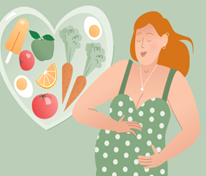Written by UConn Dietetics Masters student Magdalena Polkowski.
During pregnancy, specific nutrients become especially important for your baby’s growth and development. These nutrients include folic acid, iron, calcium, and vitamin D.1 As the need for these nutrients increases before and during pregnancy, it may become challenging for you, as a mom-to-be, to meet your requirements. The easiest and most important way to get your essential nutrients is by taking prenatal vitamins, which are specially made with increased amounts of specific and important nutrients.2 While prenatal vitamins provide enough folic acid and iron, it is essential to choose one that also includes the recommended amount of calcium and vitamin D.2 Eating foods rich with these nutrients can also be wise!
growth and development. These nutrients include folic acid, iron, calcium, and vitamin D.1 As the need for these nutrients increases before and during pregnancy, it may become challenging for you, as a mom-to-be, to meet your requirements. The easiest and most important way to get your essential nutrients is by taking prenatal vitamins, which are specially made with increased amounts of specific and important nutrients.2 While prenatal vitamins provide enough folic acid and iron, it is essential to choose one that also includes the recommended amount of calcium and vitamin D.2 Eating foods rich with these nutrients can also be wise!
Folic acid
When you’re pregnant, the daily recommended amount of folic acid is 600mcg.1 This special B vitamin helps prevent defects in your baby’s brain and spine, called neural tube defects.1 It can be tough to eat enough foods with folic acid, so taking a prenatal vitamin with at least 400 mcg is important. Some foods with folic acid are beans, asparagus, oranges, peanuts, dark green leafy vegetables like spinach, and folic acid fortified cereals! 3
Iron
During pregnancy, the daily recommended amount of iron is 27 mg, which is double what you needed before you were pregnant.1 Iron helps your body make more blood cells which carry oxygen to your baby. It can also help you feel less fatigued and reduce the chance of infections. Besides taking your prenatal vitamins, eating iron rich foods like iron-fortified cereals, spinach, beef, turkey, beans, and poultry can help increase iron intake.3 A tip: Consuming Vitamin C rich foods help your body absorb iron. Consider pairing your spinach salad with citrus fruits!
Calcium
The amount of calcium you need during pregnancy varies by age. If you are under 18, you need 1,300 mg of calcium a day.1 If you are over 19, then 1,000 mg of calcium is enough.1 Calcium is important because it makes a baby’s teeth and bones strong! You can get quality amounts of calcium by eating dairy products like milk, yogurts, and cheeses. Other calcium sources include calcium-fortified cereals, calcium-fortified juices, and spinach!3
Vitamin D
Vitamin D helps calcium do its job in making your baby’s teeth and bones strong. You should aim for 600 IU a day.1 Foods like Vitamin D fortified juices and cereals, and Vitamin D-rich foods like eggs, milk, and fatty fish (like salmon or sardines) are great sources of Vitamin D.3 Don’t forget to get a little sunshine most days for some extra Vitamin D! About 15-20 minutes is all it takes!
Resources:
- https://www.acog.org/womens-health/faqs/nutrition-during-pregnancy
- https://health.clevelandclinic.org/expectant-moms-choose-a-prenatal-vitamin-with-these-key-nutrients
- https://www.mayoclinic.org/healthy-lifestyle/pregnancy-week-by-week/in-depth/pregnancy-nutrition/art-20045082
This material is funded by USDA’s Supplemental Nutrition Assistance Program (SNAP).
This institution is an equal opportunity employer.